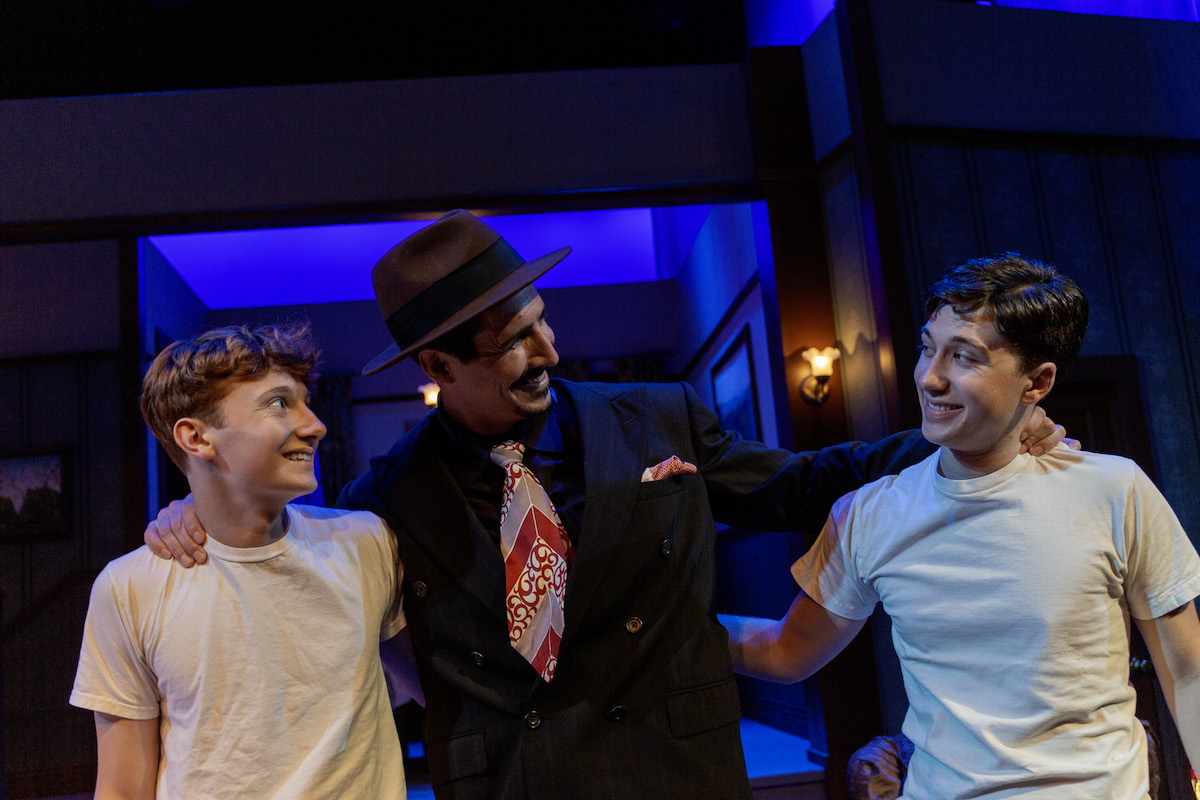Theater Review | ‘Lost in Yonkers’ Brings a New York Tale to Santa Barbara
Young Actors are Standouts in The Theatre Group at Santa Barbara City College’s Take on Neil Simon’s Beloved Play

When it premiered on Broadway in 1991, Neil Simon’s Lost in Yonkers was a triumph on multiple fronts. Running for nearly 800 performances, the show was a dazzling critical and commercial hit, nabbing four Tony Awards, four Drama Desk Awards, and a Pulitzer. It was also something of an artistic coup for Simon, whose work, though much beloved by audiences, had often been dismissed by critics as frivolous; long on snappy quips, short on dramatic ballast. Shot through with weighty meditations on masculinity, parenting, identity, and intergenerational trauma, Yonkers upended these perceptions. To this day, it is widely regarded as the humorist’s greatest work
In its new production of Lost in Yonkers, The Theatre Group at Santa Barbara City College takes a swing at honoring this towering legacy. Set in Yonkers, New York, in 1942, the show centers on brothers Jay, 15 and a half, and Arty, two years his junior. In the wake of their mother’s death, Jay and Arty find themselves in the care of their father, Eddie. To pay off his late wife’s hospital bills, Eddie has resorted to a loan shark. Now, lest he end up on the wrong side of his unforgiving creditors, he must leave New York to seek work selling scrap iron to ship yards in the South.
Jay and Arty, for their part, are to be left behind in Yonkers, tended to by Eddie’s flighty sister Bella and his mother, Grandma Kurnitz — a steely and exacting matriarch whose only shreds of sweetness are bottled up for sale in the candy store she inexplicably owns. Certainly, she has little sugar to spare for Jay and Arty, whom she regards more as burdensome strangers than as grandchildren.
The Theater Group’s rendering of this snappy, heartfelt story is anchored by a standout lead performance from SBCC Theater Arts student Luke David Hamilton. As Jay, Hamilton is breezy, unaffected, and earnest, slipping into the rhythms of Simon’s trademark humor with ease. Playing off of Arty’s deadpan quips with a sharp sense of comedic timing, Hamilton captures Jay’s plucky buoyancy while never losing touch with the stakes of his predicament: Thrust into the world of work and caught in the crossfire of long simmering family antagonisms, he must suddenly fill out the shoulders of his just-barely-too-big suit jacket, standing in for his wayward father even as he does battle with his unsparing grandmother.
Hamilton finds a strong scene partner in San Marcos sophomore Guy Challen as Arty. On the page and on screen (see Martha Coolidge’s 1993 film adaptation, for instance), Arty often comes off as all-too world weary; flip, knowing, and acerbic, he only glancingly resembles a 13-year-old living in a strange place, under strange circumstances. By contrast, Challen’s Arty is refreshingly pared back. Understated and charming, he turns in one-liners with verve while still imbuing the character with a much needed measure of adolescent naivete.
Also delivering strong performances are Leslie Ann Story, whose Grandma Kurnitz is severe yet measured, and Peter Fuller as Eddie’s fast-talking, huckster brother, Louie. With Guys and Dolls bravado, Fuller in particular lights up the back half of the play’s first act, channeling a deep bench of theatrical and cinematic flim-flammers, grifters, hustlers, and wanna-be mobsters. Draped in billowing, silken shirts and wide-leg trousers (credit to costume designer Pamela Shaw), Fuller cuts an imposing and appropriately immodest silhouette — a showman masquerading as a businessman.
Some of the show’s other performances, however, falter. As Eddie and Bella, Robert Moris Castillo and Leesa Beck are often broad and overly mannered, their performances hovering just above the meat of the text. Eddie, for instance, is a man of pained attachments. Ardently committed to a mother who returns precious little of his affection and dedicated to a sanguine vision of America as the land of opportunity even as he scrambles to eke out the barest of livings along its economic margins, he is alienated from home and nation alike. Little of Eddie’s pathos makes it to the stage, however. Where on the page his hopes are often laced with a certain sourness, as if right on the edge of curdling, here, they are played more or less straight.
Not exactly a fatal flaw, this approach mutes the thematic bass note that distinguishes Lost in Yonkers from the rest of Simon’s oeuvre. Though suffused with a characteristic wit, there is much in Simon’s script — including Eddie’s status as a kind of neutered and displaced patriarch, a man repeatedly wounded by the very institutions he so passionately defends — that suggests a deep ambivalence toward conventional ideas about family, home, and nation. While some of this ambivalence goes missing between text and stage, The Theatre Group at SBCC’s production of Lost in Yonkers will still certainly delight fans of Simon’s other comedies, and offers an exciting glimpse of some emerging local talent.
Lost in Yonkers runs through October 26 at the Garvin Theater at Santa Barbara City College. Click here for tickets and additional information.
Premier Events
Thu, Nov 28
12:00 PM
Santa Barbara
Thanksgiving Dinner at The Harbor Restaurant
Fri, Nov 22
11:00 AM
Santa Barbara
Santa Barbara Antique & Vintage Show & Sale
Fri, Nov 22
6:00 PM
Santa Barbara
Introduction to Crochet Workshop
Fri, Nov 22
7:30 PM
Carpinteria
Rod Stewart VS. Rolling Stones Tribute Show
Fri, Nov 22
9:00 PM
Santa Barbara
Numbskull Presents: Jakob’s Castle
Sat, Nov 23
11:00 AM
Santa Barbara
Santa Barbara Antique & Vintage Show & Sale
Sat, Nov 23
12:00 PM
Santa Barbara
Fall 2024 Healing Arts Faire
Sat, Nov 23
7:30 PM
Santa Barbara
SBCC Theatre Arts Department presents “Mrs. Bob Cratchit’s Wild Christmas Binge”
Sun, Nov 24
11:00 AM
Santa Barbara
Santa Barbara Antique & Vintage Show & Sale
Sun, Nov 24
6:00 PM
Santa Barbara
¡Viva el Arte de Santa Bárbara! Mariachi Garibaldi de Jaime Cuellar
Sun, Dec 01
5:00 PM
Santa Barbara
Paseo Nuevo Tree Lighting Ceremony
Thu, Nov 28 12:00 PM
Santa Barbara
Thanksgiving Dinner at The Harbor Restaurant
Fri, Nov 22 11:00 AM
Santa Barbara
Santa Barbara Antique & Vintage Show & Sale
Fri, Nov 22 6:00 PM
Santa Barbara
Introduction to Crochet Workshop
Fri, Nov 22 7:30 PM
Carpinteria
Rod Stewart VS. Rolling Stones Tribute Show
Fri, Nov 22 9:00 PM
Santa Barbara
Numbskull Presents: Jakob’s Castle
Sat, Nov 23 11:00 AM
Santa Barbara
Santa Barbara Antique & Vintage Show & Sale
Sat, Nov 23 12:00 PM
Santa Barbara
Fall 2024 Healing Arts Faire
Sat, Nov 23 7:30 PM
Santa Barbara
SBCC Theatre Arts Department presents “Mrs. Bob Cratchit’s Wild Christmas Binge”
Sun, Nov 24 11:00 AM
Santa Barbara
Santa Barbara Antique & Vintage Show & Sale
Sun, Nov 24 6:00 PM
Santa Barbara
¡Viva el Arte de Santa Bárbara! Mariachi Garibaldi de Jaime Cuellar
Sun, Dec 01 5:00 PM
Santa Barbara






















